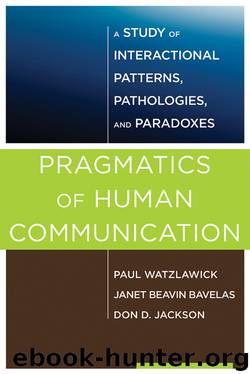Pragmatics of Human Communication by Paul Watzlawick

Author:Paul Watzlawick [Watzlawick, Paul; Bavelas, Janet Beavin; Jackson, Don D.]
Language: eng
Format: epub
ISBN: 978-0-393-70722-9
Publisher: W. W. Norton & Company
Published: 2011-04-02T16:00:00+00:00
CHAPTER SIX
Paradoxical Communication
6.1 The Nature of Paradox
Paradox has fascinated the human mind for the last two thousand years, and it continues to do so in the present day. In fact, some of this century’s most important achievements in the areas of logic, mathematics, and epistemology deal, or are intimately linked, with paradox, notably the development of metamathematics or the theory of proof, the theory of logical types, and problems of consistency, computability, decidability, and the like. As uninitiated outsiders, frustrated by the complex and esoteric nature of these subjects, we are inclined to dismiss them as too abstract to be of importance for our lives. Some may recall the classical paradoxes from school days, though probably as little more than amusing oddities. The purpose of this and the following chapters, however, is to show that there is something in the nature of paradox that is of immediate pragmatic and even existential import for all of us; paradox not only can invade interaction and affect our behavior and our sanity (s. 6.4), but also it challenges our belief in the consistency, and therefore the ultimate soundness, of our universe (s. 8.5 and 8.63). Furthermore, in section 7.4 we will try to show that deliberate paradox, in the spirit of Hippocrates’s maxim “Likes are cured by likes,” has significant therapeutic potential; and section 7.6 will touch briefly on the role of paradox in some of the noblest pursuits of the human mind. We hope that from this treatment of paradox it will be seen that consideration of the concept of paradox is of central importance and by no means a retreat into an ivory tower, although we will first have to examine its logical foundation.
6.11 Definition Paradox may be defined as a contradiction that follows correct deduction from consistent premises. This definition allows us to exclude immediately all those forms of “false” paradoxes that are based on a concealed error in reasoning or some fallacy deliberately built into the argument.1 However, already at this point the definition becomes fuzzy, for the division of paradoxes into real and false ones is relative. Today’s consistent premises are not at all unlikely to be tomorrow’s errors or fallacies. For instance, Zeno’s paradox of Achilles and the turtle he could not overtake was undoubtedly a “true” paradox until it was discovered that infinite, converging series (in this case the constantly diminishing distance between Achilles and the turtle) have a finite limit.2 Once this discovery was made and a hitherto trusted assumption proved fallacious, the paradox no longer existed. This point is made clear by Quine:
Revision of a conceptual scheme is not unprecedented. It happens in a small way with each advance in science, and it happens in a big way with the big advances, such as the Copernican revolution and the shift from Newtonian mechanics to Einstein’s theory of relativity. We can hope in time even to get used to the biggest such changes and to find the new schemes natural. There was a time when
Download
This site does not store any files on its server. We only index and link to content provided by other sites. Please contact the content providers to delete copyright contents if any and email us, we'll remove relevant links or contents immediately.
The Art of Thinking Clearly by Rolf Dobelli(8841)
The 5 Love Languages: The Secret to Love That Lasts by Gary Chapman(8493)
Mindhunter: Inside the FBI's Elite Serial Crime Unit by John E. Douglas & Mark Olshaker(7833)
Becoming Supernatural by Dr. Joe Dispenza(7104)
Nudge - Improving Decisions about Health, Wealth, and Happiness by Thaler Sunstein(6633)
The Road Less Traveled by M. Scott Peck(6633)
Enlightenment Now: The Case for Reason, Science, Humanism, and Progress by Steven Pinker(6405)
Win Bigly by Scott Adams(6310)
Mastermind: How to Think Like Sherlock Holmes by Maria Konnikova(6234)
The Way of Zen by Alan W. Watts(5798)
Factfulness: Ten Reasons We're Wrong About the World – and Why Things Are Better Than You Think by Hans Rosling(4021)
The State of Affairs by Esther Perel(3926)
Gerald's Game by Stephen King(3918)
Man's Search for Meaning by Viktor Frankl(3631)
The Confidence Code by Katty Kay(3566)
Thinking in Bets by Annie Duke(3531)
The Worm at the Core by Sheldon Solomon(2917)
Enlightenment Now by Steven Pinker(2913)
Liar's Poker by Michael Lewis(2810)
